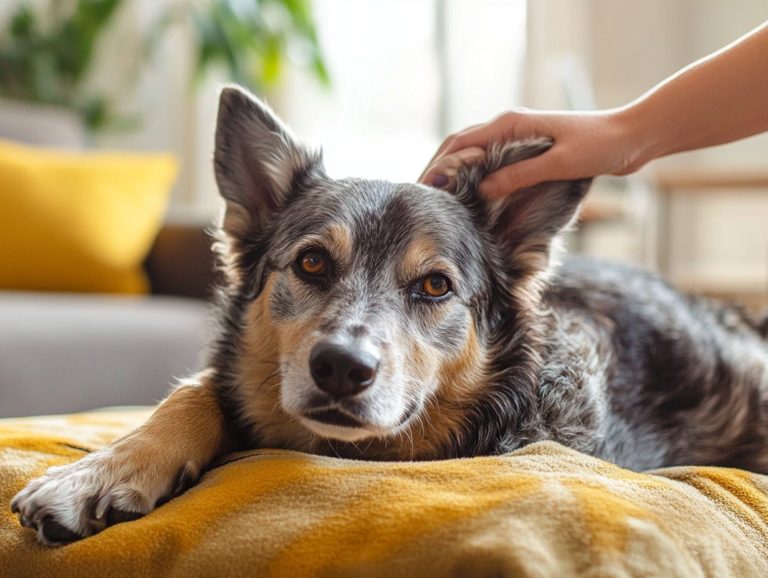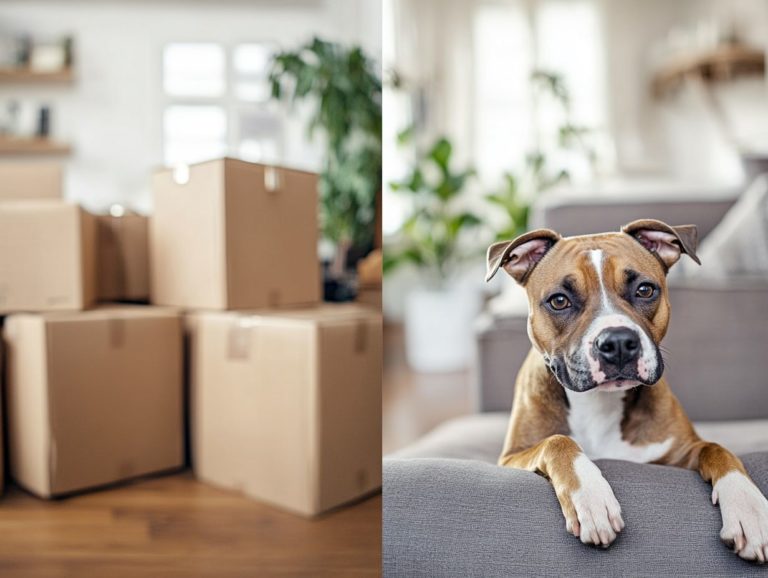How to Help a Pet with Travel Anxiety
Traveling with pets can be a delightful adventure. However, for many furry companions, it often brings stress and anxiety.
Understanding the causes and triggers of travel anxiety is crucial for you as a pet owner. This knowledge ensures that your beloved animal feels safe and secure on the road.
This article will guide you in identifying the signs of anxiety in your pet. It will offer effective strategies for managing their stress before and during travel and explore alternative solutions, including natural remedies.
The article will also discuss when to consult a veterinarian or animal behaviorist for additional support.
With the right approach, you can transform travel time into quality moments for both you and your pet.
Contents
- Key Takeaways:
- Understanding Travel Anxiety in Pets
- Signs and Symptoms of Travel Anxiety
- Managing Travel Anxiety in Pets
- Alternative Solutions for Travel Anxiety
- Seeking Professional Help
- Frequently Asked Questions
- How can I tell if my pet has travel anxiety?
- What can I do to help my pet with travel anxiety?
- Is it safe to give my pet medication for travel anxiety and car sickness?
- Can I travel with my pet if they have severe travel anxiety or motion sickness?
- How can I make my pet more comfortable during travel and help with their anxiety?
- Are there any natural remedies for travel anxiety, car sickness, and other stressful experiences in pets?
Key Takeaways:
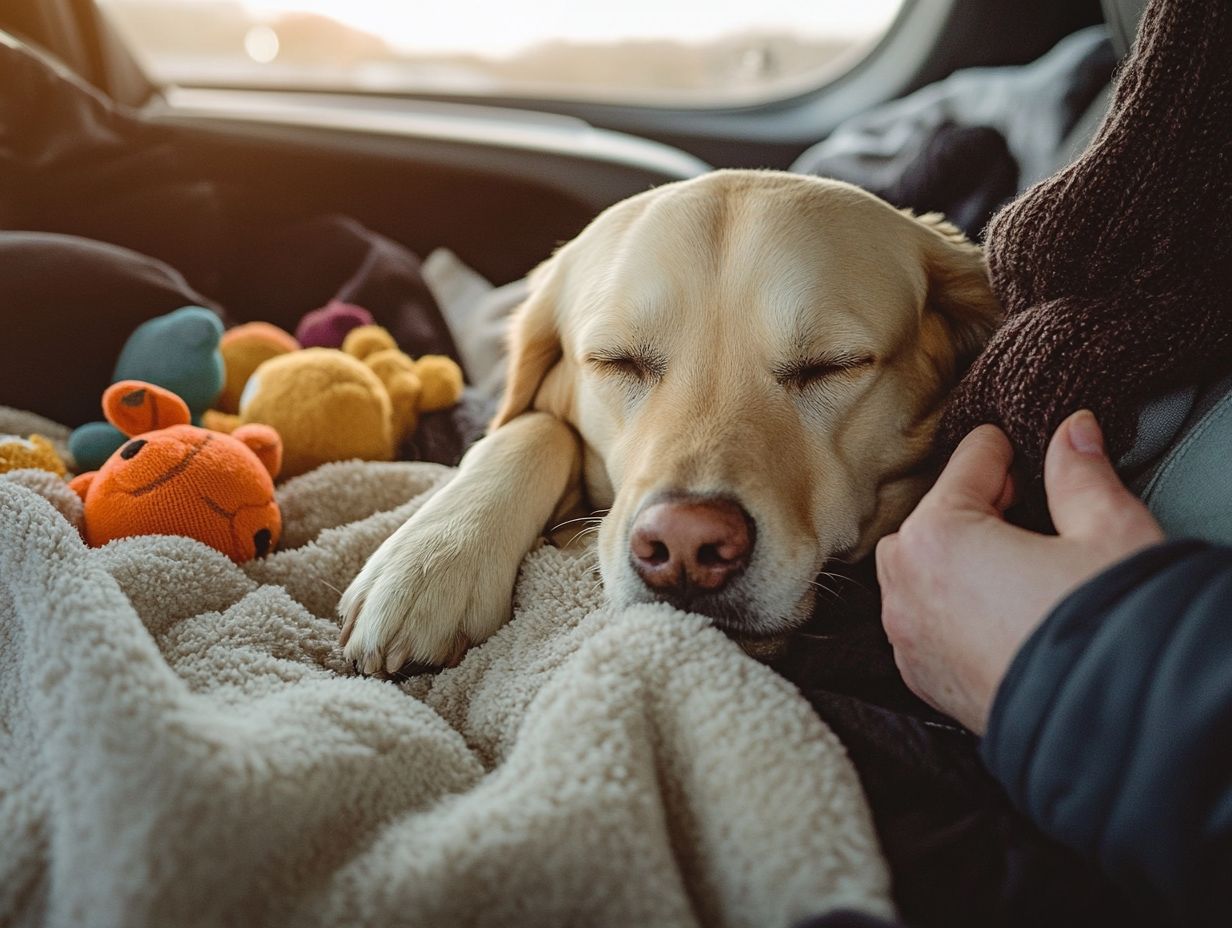
- Identify the causes of travel anxiety in your pet to better understand and manage their condition.
- Spot anxiety signs to help during travel.
- Prepare properly to ease anxiety. Seek professional help if needed.
Understanding Travel Anxiety in Pets
Understanding travel anxiety in pets, especially in dogs, is essential for any discerning pet owner. This knowledge helps guarantee a comfortable and safe travel experience for your beloved companions. Many dogs suffer from travel anxiety, and the effects of moving on pet anxiety can become evident during car rides, vet visits, or other stressful situations, ultimately affecting their behavior and overall well-being.
By recognizing the signs of anxiety and employing effective strategies like gradual exposure to stressful situations and rewarding good behavior, you can help alleviate your pet’s discomfort. For specific techniques, check out how to help a rescue pet with anxiety. This fosters a more positive association with travel that benefits both of you.
Causes and Triggers
Numerous factors can contribute to your dog s anxiety, especially during travel, leading to upset behaviors in your beloved pet.
Some dogs may carry unsettling memories from past experiences perhaps a bumpy car ride or a trip to the vet that can instill a lasting fear of travel. Motion sickness is another common issue, causing nausea and discomfort that can quickly turn what should be an enjoyable outing into a distressing ordeal.
Being in unfamiliar environments with new smells, sounds, and sights can overwhelm some dogs, amplifying their anxiety. In these situations, engaging a qualified behaviorist is essential. They can identify the root causes of your dog’s anxiety and help design tailored interventions.
With consistent training and gradual exposure to travel, you can work alongside professionals to ease your furry companion into a more relaxed state. This transforms future journeys into far more enjoyable experiences.
Signs and Symptoms of Travel Anxiety
Recognizing the signs and symptoms of travel anxiety in dogs is crucial for responsible pet owners. Early detection allows for effective interventions, ultimately leading to more enjoyable travel experiences for both you and your furry companion.
Identifying Anxiety in Pets
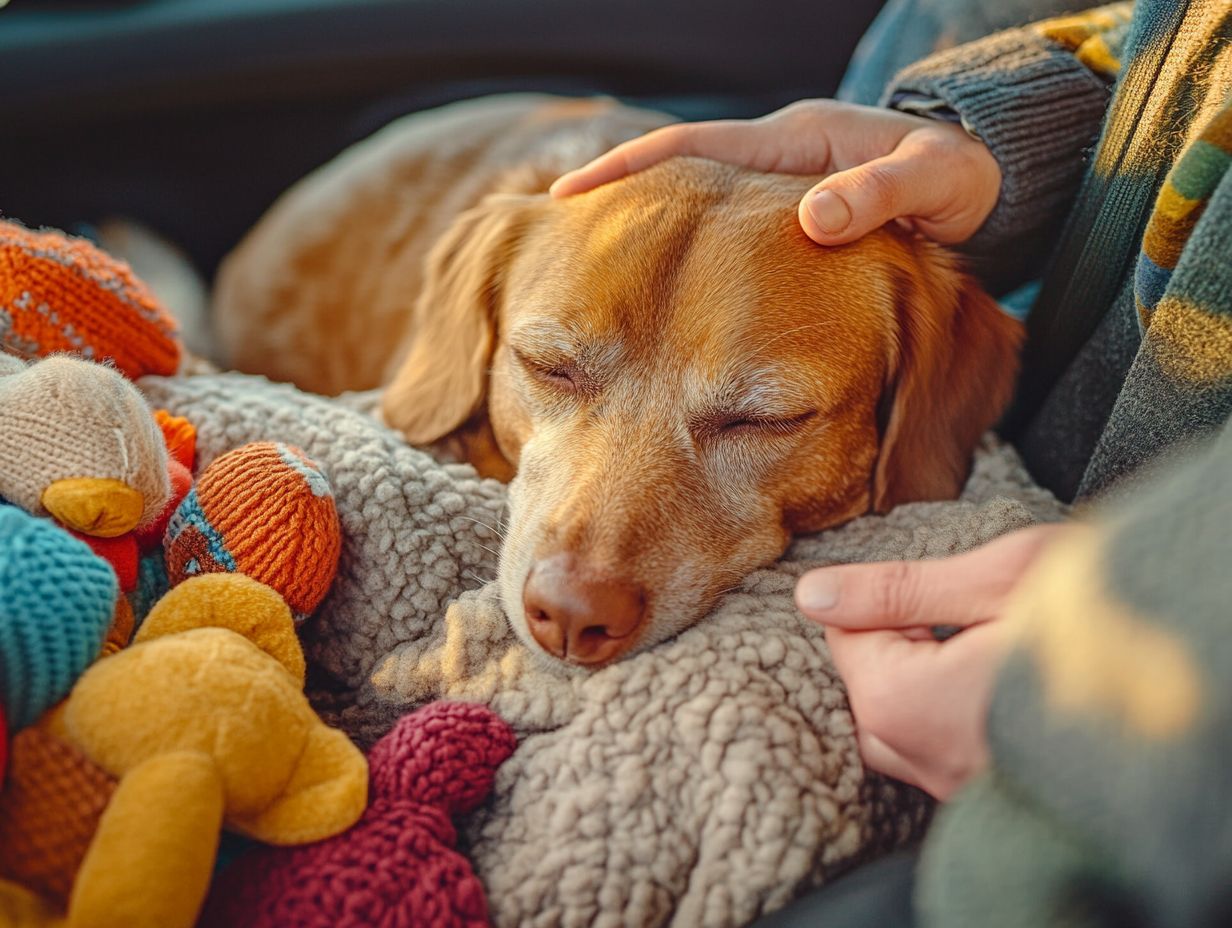
Identifying anxiety in pets calls for your keen observation and a deep understanding of their behavior during stressful situations, such as travel or those dreaded vet visits.
This level of attentiveness can unveil subtle cues like excessive panting, pacing, or even attempts to hide that might otherwise go unnoticed. Don’t overlook vocal signals; whines, barks, or growls can be clear indicators of distress. It’s essential to recognize that each dog expresses anxiety in its own unique way, making it imperative for you to familiarize yourself with your individual dog’s body language.
Early intervention is key, and employing proper training techniques can help prevent anxiety from taking root. Rewarding calm behavior and creating a safe environment are both effective strategies. If anxiety lingers or escalates, consulting a professional, such as a behaviorist, can offer you personalized strategies to tackle more serious issues.
Remember, a little preparation goes a long way in keeping your pet happy on the road!
Managing Travel Anxiety in Pets
Managing travel anxiety in pets is essential for creating a positive and enjoyable experience for both you and your furry companion. To effectively address this issue, consider learning how to seek help for your anxious pet, especially during car trips or visits to the vet.
By addressing their anxiety, you enhance their comfort and ensure that your shared journeys are as smooth and stress-free as possible.
Pre-travel Preparations
Pre-travel preparations can significantly ease your dog’s anxiety, helping them feel safe and relaxed before embarking on a journey. To learn more about this, consider checking out how to identify if your pet has anxiety.
Gradually acclimate your dog to their travel crate to create a familiar and secure space. Using special scents that help dogs relax can enhance this comforting atmosphere, effectively reducing stress levels for your furry friend.
It s also a good idea to pack their favorite toy, as it serves as a source of comfort during the trip. Establishing a calm environment through a consistent routine leading up to travel helps your dog adjust and minimizes the chances of overwhelming them.
This proactive approach will make your travels unforgettable!
During Travel Strategies
Implementing effective strategies during travel can significantly alleviate anxiety in dogs, transforming the experience into a delightful adventure for both you and your furry companion.
Incorporate calming supplements into your dog’s routine for extra support. Consider playing soothing music designed for dogs; this can create a peaceful atmosphere in your vehicle and further diminish their stress levels.
Using a secure travel harness is essential for ensuring their safety and comfort throughout the journey. Don’t overlook the importance of regular breaks; stopping frequently allows bathroom breaks and gives your dog a chance to stretch their legs, greatly enhancing their mood.
Reward positive behavior with treats or praise to reinforce their love for travel, helping to cultivate lasting comfort and confidence on the road.
Alternative Solutions for Travel Anxiety
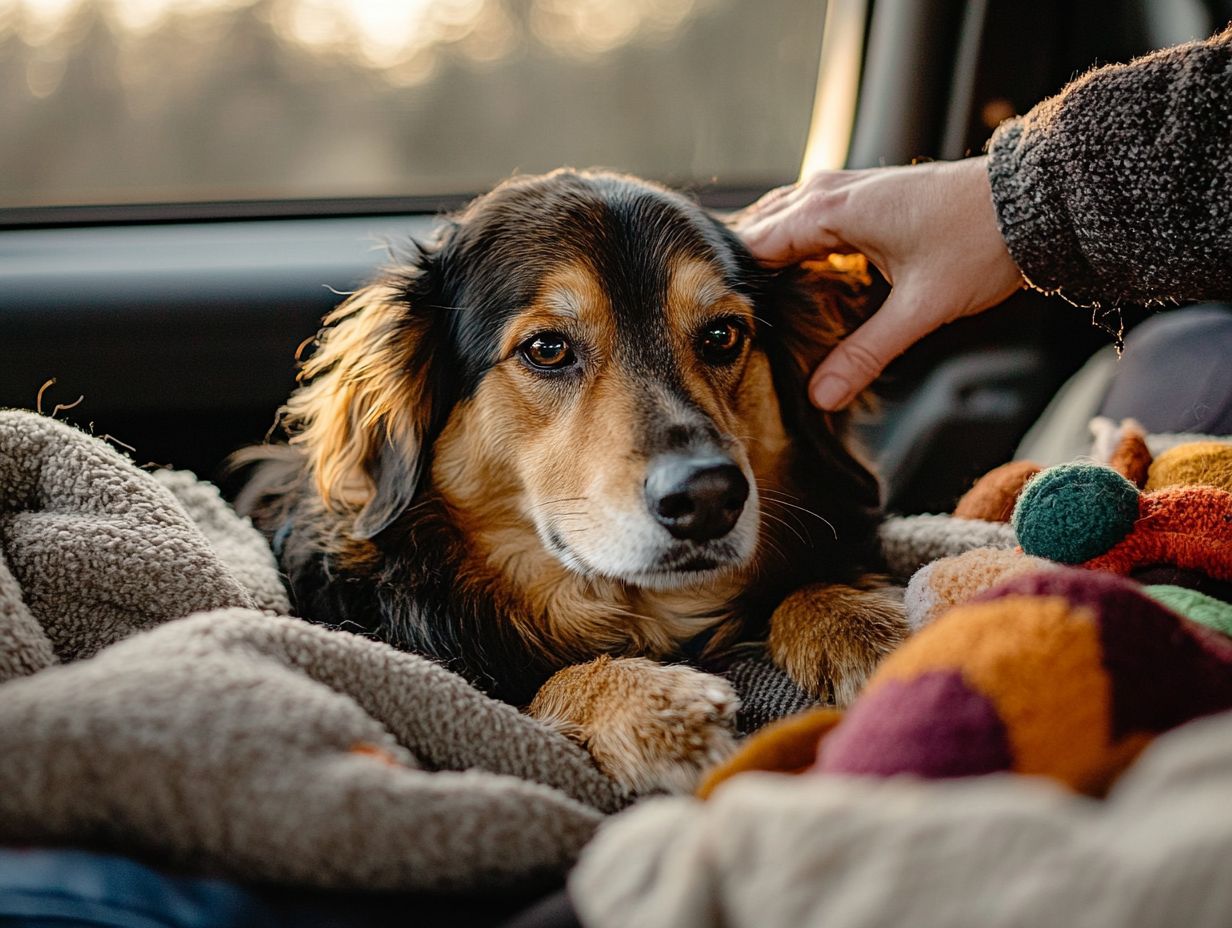
Exploring alternative solutions for travel anxiety offers valuable resources, especially if you’re a pet owner seeking soundproofing tips for anxious pets to help your dog navigate the challenges of travel.
Natural Remedies and Therapies
Natural remedies and therapies can be effective alternatives for managing your dog s anxiety, offering holistic options that cater to your concerns as a devoted pet owner.
These methods aim to reduce stress and promote overall well-being gently. One popular choice is the Thundershirt, which applies gentle pressure to your dog s body, helping to calm nerves during stressful events like thunderstorms or travel.
Consider calming supplements made from natural ingredients like valerian root or chamomile, which can ease tension and foster relaxation. Another option is Rescue Remedy, a floral essence blend that utilizes specific flower extracts to support emotional balance.
When combined, these remedies offer a multifaceted approach to alleviating anxiety, ensuring that both you and your pet can enjoy travel and new experiences together.
Seeking Professional Help
When dealing with a dog’s travel anxiety that feels overwhelming, seeking professional help is essential. Veterinarians and animal behaviorists can provide personalized solutions specifically tailored to your pet’s needs. Additionally, understanding best practices for traveling with anxious pets can ensure a smoother journey for both of you.
Start preparing your pet for their next adventure today!
When to Consult a Veterinarian or Animal Behaviorist
Knowing when to reach out to a veterinarian or an animal behaviorist is essential for managing severe dog anxiety and ensuring your furry friend gets the appropriate care.
This is especially important when your canine companion shows persistent signs of distress, such as relentless barking, destructive behavior, or excessive panting, even after you’ve made environmental adjustments or tried various training techniques.
If these behavioral issues are pronounced and challenging to manage alone, enlisting the help of a veterinarian can provide invaluable insights. These professionals can prescribe anxiety medication, which can be crucial to your strategy. When combined with training to change your dog’s behavior from certified behaviorists, this comprehensive approach can help you address your dog s anxiety more effectively and compassionately.
Frequently Asked Questions
How can I tell if my pet has travel anxiety?
There are several signs that may indicate your pet has travel anxiety, including excessive drooling, panting, shaking, pacing, and whining. They may also try to hide or become aggressive. If you notice any of these behaviors, it’s important to address your pet’s anxiety promptly to ensure a smoother trip.
What can I do to help my pet with travel anxiety?
To help your pet with travel anxiety, acclimate them to their carrier or crate before the trip, use calming aids like pheromone sprays or supplements, and gradually expose them to short trips before a longer journey. For more detailed strategies, check out this guide on helping an anxious pet adjust to new environments.
Is it safe to give my pet medication for travel anxiety and car sickness?
Talk to your veterinarian about the best options for your pet. They can recommend a safe and appropriate medication tailored to your pet’s specific needs and monitor for any potential side effects. Avoid giving your pet human medications without consulting a professional first.
Can I travel with my pet if they have severe travel anxiety or motion sickness?
Traveling with a pet who has severe travel anxiety is not recommended. It can be stressful and potentially dangerous for them, as well as disruptive for other passengers. Consider alternatives, such as hiring a pet sitter or finding pet-friendly accommodations.
How can I make my pet more comfortable during travel and help with their anxiety?
To make your pet more comfortable during travel, set up their carrier or crate with familiar items like bedding and toys. Covering the carrier with a blanket can create a den-like environment. Keep your pet’s routine as normal as possible and provide plenty of breaks and opportunities for exercise during the journey.
Are there any natural remedies for travel anxiety, car sickness, and other stressful experiences in pets?
Yes, some natural remedies may alleviate travel anxiety in pets. These include using calming essential oils, playing soothing music, and offering treats or toys to distract them during travel. For more comprehensive strategies, check out this guide on how to recognize and address anxiety in pets. Always consult with your veterinarian before trying any new remedies for your pet.
Take the first step towards a stress-free journey with your pet start preparing today!


